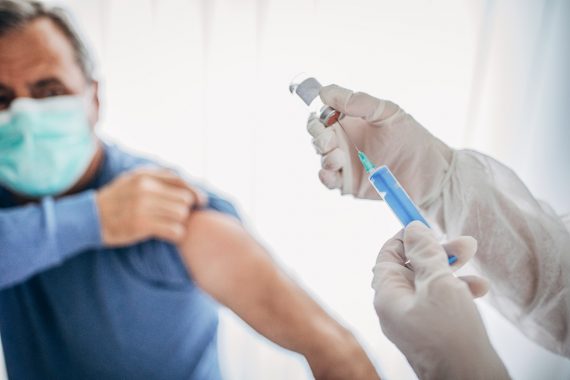Guidance on vaccinating individuals on immunosuppressive treatment
This information is sourced from:
ARMA, Versus Arthritis, Specialist Pharmacy Service (SPS), The Green Book Chapter 14a, JCVI prioritisation document , UK Chemotherapy Board
Key points:
- Immunosuppression may be due to disease itself or due to treatments.
- All patients should be encouraged to receive one of the Covid-19 vaccines regardless of their treatment regimen or underlying diagnosis.
- The benefits of the Covid-19 vaccination outweigh the risks including the risk of developing severe illness.
- Frequently, the immune response of immunocompromised persons/those on immunosuppressant treatment to these vaccines is reduced and they should continue to avoid exposure to Covid-19.
- Immunosuppressed patients (see criteria below) should receive three doses of Covid vaccine as part of a primary course if over 18. The third dose should be given eight weeks after the second dose.1
- They should also receive a booster vaccination three months after completion of their primary course.
- The same precautions apply for those who are immunocompromised as for the general population regarding, for example, side effects, continued social distancing and allergy cautions.
- There are specific considerations listed in the Green book for the number, frequency and dosing of primary courses and boosters for those aged 5-17 years.
Medication considerations:
- Patients should NOT stop their immune suppressants but, if they are about to newly start immune suppression a clinical risk-benefit discussion needs to take place about having at least one vaccination prior to commencing treatment. A Decision Support Tool for patients can be used to use to aid discussion.
- If vaccines can be scheduled prior to commencing treatment, they should be given at the shortest interval licensed by the manufacturer to ensure the least time delay.
- There are a few drugs (rituximab, ocreluzimab, alemtuzumab and cladribine) which may affect (reduce) the immune response to the vaccine.
- If a patient has not started on an immune suppressant/chemotherapy medication it may be best (depending on the severity of the disease) to vaccinate prior to starting treatment (using the shortest interval licensed for the first two doses). This should be considered in collaboration with their specialist team.
- Special consideration in chemotherapy: delay vaccination until blood counts more normal and consider administering just prior to a pulse of chemotherapy (but not to be taken on the day of chemotherapy).
- Corticosteroids IM/IV/PO and intra-articular may reduce vaccine response so it may be better to delay non-urgent courses until vaccine course complete. However, if the steroid is for a flare it may be best to proceed, as flares can worsen Covid prognosis in themselves.
Criteria for immunosuppression in over 16s:
- Patients undergoing chemotherapy leading to immunosuppression
- Patients undergoing radical radiotherapy
- Solid organ transplant recipients
- Bone marrow or stem cell transplant recipients
- HIV infection at all stages
- Multiple myeloma or genetic disorders affecting the immune system (eg, IRAK-4, NEMO, complement disorder, SCID)
- Individuals who are receiving immunosuppressive or immunomodulating biological therapy including, but not limited to, anti-TNF, alemtuzumab, ofatumumab, rituximab
- Patients receiving protein kinase inhibitors or PARP inhibitors
- Individuals treated with steroid sparing agents such as cyclophosphamide and mycophenolate mofetil
- Individuals treated with or likely to be treated with systemic steroids for more than a month at a dose equivalent to prednisolone 20mg or more per day for adults.
- Anyone with a history of haematological malignancy, including leukaemia, lymphoma and myeloma
- Those who require long-term immunosuppressive treatment for conditions including, but not limited to, systemic lupus erythematosus, rheumatoid arthritis, inflammatory bowel disease, scleroderma and psoriasis
The ‘at risk group’ has been expanded to include those defined as close household contacts or carers for someone with immunosuppression – ie, someone from whom it is not reasonable to maintain a physical distance. This is most relevant for children and young people aged 5-12 years who become eligible for the vaccine by virtue of living with someone classed as immunocompromised. They would otherwise (at the time of writing) not be eligible for vaccination in the UK according to the JCVI unless they themselves are ‘at risk’ for an underlying health reason.
Criteria for immunosuppression in 5-15 year olds
- Those undergoing chemotherapy or radiotherapy
- Solid organ transplant recipients
- Bone marrow or stem cell transplant recipients
- Genetic disorders affecting the immune system (eg, deficiencies of IRAK-4 or NEMO, complement disorder, SCID)
- Those with haematological malignancy, including leukaemia and lymphoma
- Those receiving immunosuppressive or immunomodulating biological therapy
- Those treated with or likely to be treated with high or moderate dose corticosteroids
- Those receiving any dose of non-biological oral immune modulating drugs, eg, methotrexate, azathioprine, 6-mercaptopurine or mycophenolate
- Those with autoimmune diseases who may require long term immunosuppressive treatments
- Children who are about to receive planned immunosuppressive therapy should be considered for vaccination prior to commencing therapy.
Written by Dr Carrie St John Wright
See also:

















